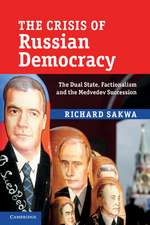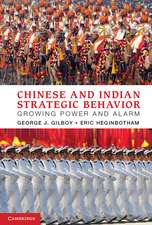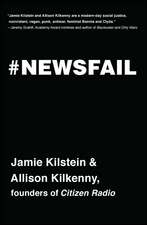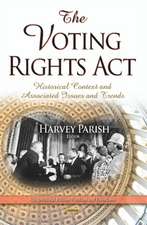Open versus Closed: Personality, Identity, and the Politics of Redistribution
Autor Christopher D. Johnston, Howard G. Lavine, Christopher M. Federicoen Limba Engleză Paperback – 19 feb 2017
Preț: 224.62 lei
Nou
Puncte Express: 337
Preț estimativ în valută:
42.98€ • 44.99$ • 35.77£
42.98€ • 44.99$ • 35.77£
Carte tipărită la comandă
Livrare economică 31 martie-14 aprilie
Preluare comenzi: 021 569.72.76
Specificații
ISBN-13: 9781107546424
ISBN-10: 1107546427
Pagini: 294
Ilustrații: 37 b/w illus. 41 tables
Dimensiuni: 152 x 228 x 18 mm
Greutate: 0.42 kg
Editura: Cambridge University Press
Colecția Cambridge University Press
Locul publicării:New York, United States
ISBN-10: 1107546427
Pagini: 294
Ilustrații: 37 b/w illus. 41 tables
Dimensiuni: 152 x 228 x 18 mm
Greutate: 0.42 kg
Editura: Cambridge University Press
Colecția Cambridge University Press
Locul publicării:New York, United States
Cuprins
List of tables; List of figures; Acknowledgements; 1. Personality and the foundations of economic preferences; 2. The psychology of ideology; 3. A dual-pathway model of openness and economic preferences; 4. Testing the reversal hypothesis; 5. Openness and partisan-ideological sorting; 6. Openness and elite influence; 7. Political engagement and self-interest; 8. Personality and American democracy; Appendices; Bibliography; Index.
Recenzii
'A creative and original investigation into the puzzling, polarizing and often contradictory personality-based forces driving economic policy preferences. It's a fascinating read and a major contribution to the field of political psychology.' Kevin Smith, University of Nebraska, Lincoln
'Political psychologists know why people adopt particular stances on social issues but the sources of economic preferences remain murky. Johnston, Lavine, and Federico rectify this situation in one fell swoop with an inventive and compelling account of the reasons many people - especially the well-informed - frequently act contrary to their own economic self-interest.' John R. Hibbing, Co-Author of Predisposed: Liberals, Conservatives and the Biology of Political Differences
'Open versus Closed develops a fascinating theoretical argument around a central dimension of personality: the disposition for being 'open' or 'closed' to uncertainty and risk. Integrating disparate strands of research in political science, economics, and psychology, Johnston, Lavine, and Federico articulate two alternative pathways for how being open versus closed shapes opinions on fundamentally important issues of social welfare, redistribution, and government intervention in the market. Through wide-ranging observational and experimental tests, the authors show that political engagement plays a critical role in leading the open vs. closed citizen to develop opinions that, among the politically unengaged, reflect what they need and that, among the politically engaged, reflect who they aspire to be. Amidst a politically polarized and economically stratified society, [this] work reminds us of the critical importance of political elites and citizen engagement in channeling how personality informs what citizens demand from government and why.' Cindy D. Kam, Vanderbilt University, Tennessee
'This is a path-breaking study. It brings into view, arguably more dramatically than any previous work, the complexity - or perhaps better the perversity - of personality and political choice. Among other things, it is on the thinking of the politically aware and engaged, not the inattentive and indifferent, that personality, the emblem of the irrational, has its strongest impact.' Paul Sniderman, Stanford University
'Open Versus Closed is certain to have a major impact on the field. Not only do Johnston, Lavine, and Federico comprise a veritable all-star team of co-authors, their book embodies the best features of political psychology. It doesn't give short shrift to the political in its exploration of the psychological. Instead the emphasis on the psychological allows them to solve an important political puzzle about attitudes toward redistribution that no one else has been able to crack.' Marc J. Hetherington, Vanderbilt University, Tennessee
'Political psychologists know why people adopt particular stances on social issues but the sources of economic preferences remain murky. Johnston, Lavine, and Federico rectify this situation in one fell swoop with an inventive and compelling account of the reasons many people - especially the well-informed - frequently act contrary to their own economic self-interest.' John R. Hibbing, Co-Author of Predisposed: Liberals, Conservatives and the Biology of Political Differences
'Open versus Closed develops a fascinating theoretical argument around a central dimension of personality: the disposition for being 'open' or 'closed' to uncertainty and risk. Integrating disparate strands of research in political science, economics, and psychology, Johnston, Lavine, and Federico articulate two alternative pathways for how being open versus closed shapes opinions on fundamentally important issues of social welfare, redistribution, and government intervention in the market. Through wide-ranging observational and experimental tests, the authors show that political engagement plays a critical role in leading the open vs. closed citizen to develop opinions that, among the politically unengaged, reflect what they need and that, among the politically engaged, reflect who they aspire to be. Amidst a politically polarized and economically stratified society, [this] work reminds us of the critical importance of political elites and citizen engagement in channeling how personality informs what citizens demand from government and why.' Cindy D. Kam, Vanderbilt University, Tennessee
'This is a path-breaking study. It brings into view, arguably more dramatically than any previous work, the complexity - or perhaps better the perversity - of personality and political choice. Among other things, it is on the thinking of the politically aware and engaged, not the inattentive and indifferent, that personality, the emblem of the irrational, has its strongest impact.' Paul Sniderman, Stanford University
'Open Versus Closed is certain to have a major impact on the field. Not only do Johnston, Lavine, and Federico comprise a veritable all-star team of co-authors, their book embodies the best features of political psychology. It doesn't give short shrift to the political in its exploration of the psychological. Instead the emphasis on the psychological allows them to solve an important political puzzle about attitudes toward redistribution that no one else has been able to crack.' Marc J. Hetherington, Vanderbilt University, Tennessee
Notă biografică
Descriere
This book reconceptualizes how deep-seated personality traits shape citizens' attitudes toward economic redistribution, and what it means for American democracy.











